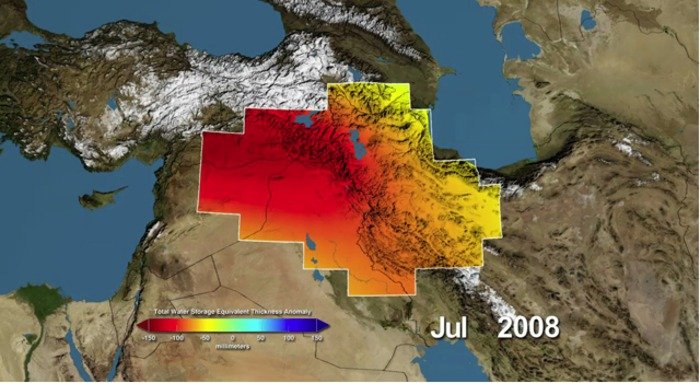Variations in total water storage from normal, in millimeters, in the Tigris and Euphrates river basins, as measured by NASA's Gravity Recovery and Climate Experiment (GRACE) satellites, from January 2003 through December 2009. Reds represent drier conditions, while blues represent wetter conditions. Credit: NASA/UC Irvine/NCAR
PASADENA, Calif., Feb. 12 (UPI) -- NASA says a study using two of its satellites confirmed large parts of the arid Middle East region lost freshwater reserves rapidly during the past decade.
U.S. scientists using data from the gravity-measuring satellites found parts of Turkey, Syria, Iraq and Iran along the Tigris and Euphrates river basins lost 117 million acre feet of total stored freshwater during a seven-year period beginning in 2003.
That is almost the amount of water in the Dead Sea, NASA's Jet Propulsion Laboratory in Pasadena, Calif., said in a release Tuesday.
Because obtaining ground-based data in the politically tense region is difficult, data from NASA's twin Gravity Recovery and Climate Experiment satellites was essential, scientists said.
Rising or falling water reserves alter Earth's mass, affecting gravity regionally, and GRACE measurements can show how much each region's water storage changes over time.
"GRACE data show an alarming rate of decrease in total water storage in the Tigris and Euphrates river basins, which currently have the second-fastest rate of groundwater storage loss on Earth, after India," principle researcher Jay Famiglietti of the University of California, Irvine, said.
"Meanwhile, demand for freshwater continues to rise, and the region does not coordinate its water management because of different interpretations of international laws."
A drought in 2007 led irrigators and other water users to turn to groundwater supplies, drawing down reserved, the researchers said.
"The Middle East just does not have that much water to begin with, and it's a part of the world that will be experiencing less rainfall with climate change," Famiglietti said. "Those dry areas are getting dryer. The Middle East and the world's other arid regions need to manage available water resources as best they can."















